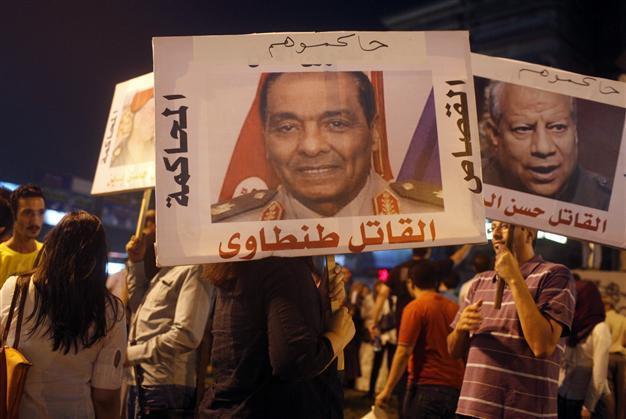Egypt court sets Aug 25 trial for Brotherhood leaders
CAIRO - Agence France-Presse

This file photo shows activists from a group called "Third Square", which promotes a middle way in the rift between the Muslim Brotherhood and supporters of the army's overthrow of Egyptian President Mohamed Mursi, carrying posters of key former army figures as they gather to oppose both parties at Sphinx Square in Cairo July 30, 2013. REUTERS/Asmaa Waguih
An Egyptian court Sunday set an August 25 trial date for the Muslim Brotherhood chief, his two deputies and three other group members for their alleged involvement in protesters' deaths.
Supreme Guide Mohammed Badie, who is currently in hiding, and his two deputies -- Khairat al-Shater and Rashad Bayoumi -- who are being held in Cairo's Tora prison, are accused of inciting violence against protesters outside the Islamist group's headquarters on June 30.
The other members are accused of killing protesters, the official MENA news agency said.
Egypt army chief meets Islamists over crisisArmy chief Abdel Fattah al-Sisi met overnight with Islamist leaders to try and resolve the crisis pitting supporters of ousted president Mohamed Morsi against Egypt's new leaders.
Sisi "met with several representatives of the Islamist movements ... and stressed that there are opportunities for a peaceful solution to the crisis provided all sides reject violence," army spokesman Colonel Ahmed Aly said in a statement, without specifying who his interlocutors were.
Morsi loyalists have been holding two major sit-ins for more than a month, paralysing parts of the capital and deepening divisions.
Authorities have repeatedly called on them to go home, promising them a safe exit.
But supporters of Morsi -- Egypt's first freely elected president-- see his July 3 ouster by the military as a violation of democracy and have insisted that nothing short of his reinstatement would end their protests.
Following a meeting with US Deputy Secretary of State William Burns, the political arm of Morsi's Muslim Brotherhood stressed its continued commitment to "legitimacy, which stipulates the return of the president, the constitution and the Shura Council," or upper house of parliament.
The US envoy's visit, which followed trips by EU foreign policy chief Catherine Ashton and German Foreign Minister Guido Westerwelle, was the latest move in a diplomatic drive to break the deadlock in Egypt.
The Islamists' latest declaration suggested that Burns's visit had failed to shift their position.
"We affirm our welcome of any political solutions proposed on the basis of constitutional legitimacy and rejection of the coup," said the statement from the Freedom and Justice Party.
Burns has also met Foreign Minister Nabil Fahmy in a bid to broker a compromise between the two sides.
Washington also kept up the pressure from afar, with Defence Secretary Chuck Hagel urging Sisi to support an "inclusive political process," the Pentagon said.
The diplomatic push came as the Washington Post published an interview with Sisi, who lashed out at Washington, urging it to pressure Morsi supporters to end their rallies.
Tensions spiked over a looming police bid to dismantle the pro-Morsi Cairo sit-ins. But Fahmy insisted authorities have "no desire to use force if there is any other avenue that has not been exhausted."
There is an open invitation for all political forces to participate. The door is open for everybody, including the Brotherhood, to participate in the process," Fahmy told reporters.
"If the political landscape does not have space for everyone, it cannot be an inclusive democracy." Morsi has been formally remanded in custody on suspicion of offences committed when he broke out of prison during the 2011 revolt that toppled former president Hosni Mubarak.
The Islamist leader, who has been held at an undisclosed location since the coup, refused to talk to the investigating judge in a meeting on Friday, said Mostafa Azab of the "Lawyers Against the Coup" movement.
Morsi "refused to talk to him and told him he didn't recognise any of the measures being taken against him," Azab told AFP, adding that the former president had refused to call a lawyer.
The interior ministry has urged pro-Morsi demonstrators to go home, saying this would allow the Brotherhood to return to politics.
"Your peaceful and safe exit will allow for the return of the Brotherhood to a role in the democratic political process," it said in a statement.
But the ministry warned that failure by protesters to leave would "expose them to legal action over the involvement in several criminal acts by some in the gatherings, including killing, torture, kidnap, carrying weapons... and incitement to violence".
Sisi told the Post he wanted Washington to push for an end to the protests.
"The US administration has a lot (of) leverage and influence with the Muslim Brotherhood and I'd really like the US administration to use this leverage with them to resolve the conflict," he said.
He said that police, not the military, would be charged with dispersing the protests, and insisted that millions of Egyptians "are waiting for me to do something" about the sit-ins.
Sisi defended the army's intervention, saying it had prevented a "civil war" but gave an enigmatic answer on the question of whether he would run for president.
"You just can't believe that there are people who don't aspire for authority," he said, when pressed.
"When the people love you -- that is the most important thing for me." Meanwhile, Ayman al-Zawahiri, the Egypt-born head of Al-Qaeda, accused Washington of "plotting" Morsi's overthrow with Egypt's military and its Christian minority.
